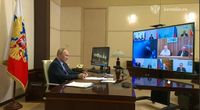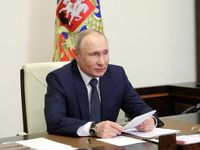On April 15, 2025, Russian President Vladimir Putin was scheduled to visit Dobrograd, a developing settlement in the Vladimir region, but the trip has been canceled. According to the Kremlin press service, the planned meeting of the Presidium of the State Council will now take place via video link instead of in person. This change in format reflects ongoing adjustments in how government functions amid shifting circumstances.
Putin's anticipated visit was meant to focus on the development of infrastructure for life, a topic that has garnered significant attention in recent months. The meeting was seen as an opportunity for the President to engage directly with local authorities and deputies, providing an essential platform for discussing pressing issues in the region.
Historically, Dobrograd has been a focal point for Putin’s interest. He has visited the region four times throughout his political career. His first visit was in 2000, where he explored cultural sites and participated in a New Year's event for orphans. In 2004, he attended a Christmas service in Suzdal, and in 2015, he was present at the "Territory of Meanings on the Klyazma" forum. His last visit to the area occurred in 2016, when he was shown plans for Dobrograd, a city designed to accommodate immigrants.
During his video conference, Putin emphasized the importance of creating a modern, safe, and accessible environment across all municipalities. He addressed various issues, including housing, personnel challenges, and the broad accessibility of transport and social services. The President underscored that a comprehensive approach to these tasks is vital for supporting key settlements where two-thirds of the Russian population resides.
In a notable moment during the conference, Putin spoke with a resident of Dobrograd, a young man originally from Germany. The conversation, conducted in German, highlighted the personal nature of the discussions, as the resident sought assistance in obtaining Russian citizenship. The President assured him of his support in this matter, showcasing a human touch amidst the broader policy discussions.
The shift to a video conference format has stirred various reactions. Initially, there was anticipation surrounding the potential for face-to-face interaction between Putin and regional leaders, including Governor Alexander Avdeev. This visit was expected to significantly enhance Avdeev's standing and authority within the region. Experts noted that such a high-profile meeting could have lasting implications for Avdeev’s political career.
However, the cancellation of the in-person meeting means that the governor's opportunity to engage directly with the President has been postponed. This change was met with disappointment by local officials who had prepared extensively for the visit. The Kremlin had indicated that this meeting would be a significant milestone in Avdeev's political journey, marking a rare occasion for a regional leader to interact closely with the head of state.
Despite the cancellation, the discussion around Dobrograd remains vibrant. The city is viewed as a potential center for business and socio-political life, not just within the Vladimir region but across the country. Recent discussions in the State Duma have proposed granting special status to new cities created through public-private partnerships, which could provide systemic support for projects like Dobrograd. This legislative initiative reflects a growing recognition of the city’s strategic importance.
Alexei Govyrin, a member of the Committee of the Lower House of Parliament on Small and Medium Enterprises and a key figure in the city’s establishment, has been advocating for this special status. He believes that such recognition will facilitate the growth and development of Dobrograd, positioning it as a model for future urban projects in Russia.
Last week, Dobrograd hosted a strategic session titled "Cities of the Future: The Role of Business in Territorial Development," which attracted participants from 22 regions of Russia and numerous entrepreneurs. This event was viewed as a preparatory step for high-level discussions, indicating the city’s potential as a hub for innovation and development.
As the Kremlin adjusts its approach to governance and public engagement, the emphasis on digital communication has become increasingly apparent. While the shift to video conferencing may limit personal interaction, it also reflects a broader trend toward modernization and adaptation in government practices.
In summary, while Putin's canceled visit to Dobrograd represents a missed opportunity for direct engagement with local leaders, the ongoing discussions about infrastructure development, citizenship issues, and legislative support for new cities signal a commitment to addressing the needs of the region. The future of Dobrograd remains bright, with potential for significant growth and recognition as a key player in Russia's urban landscape.




